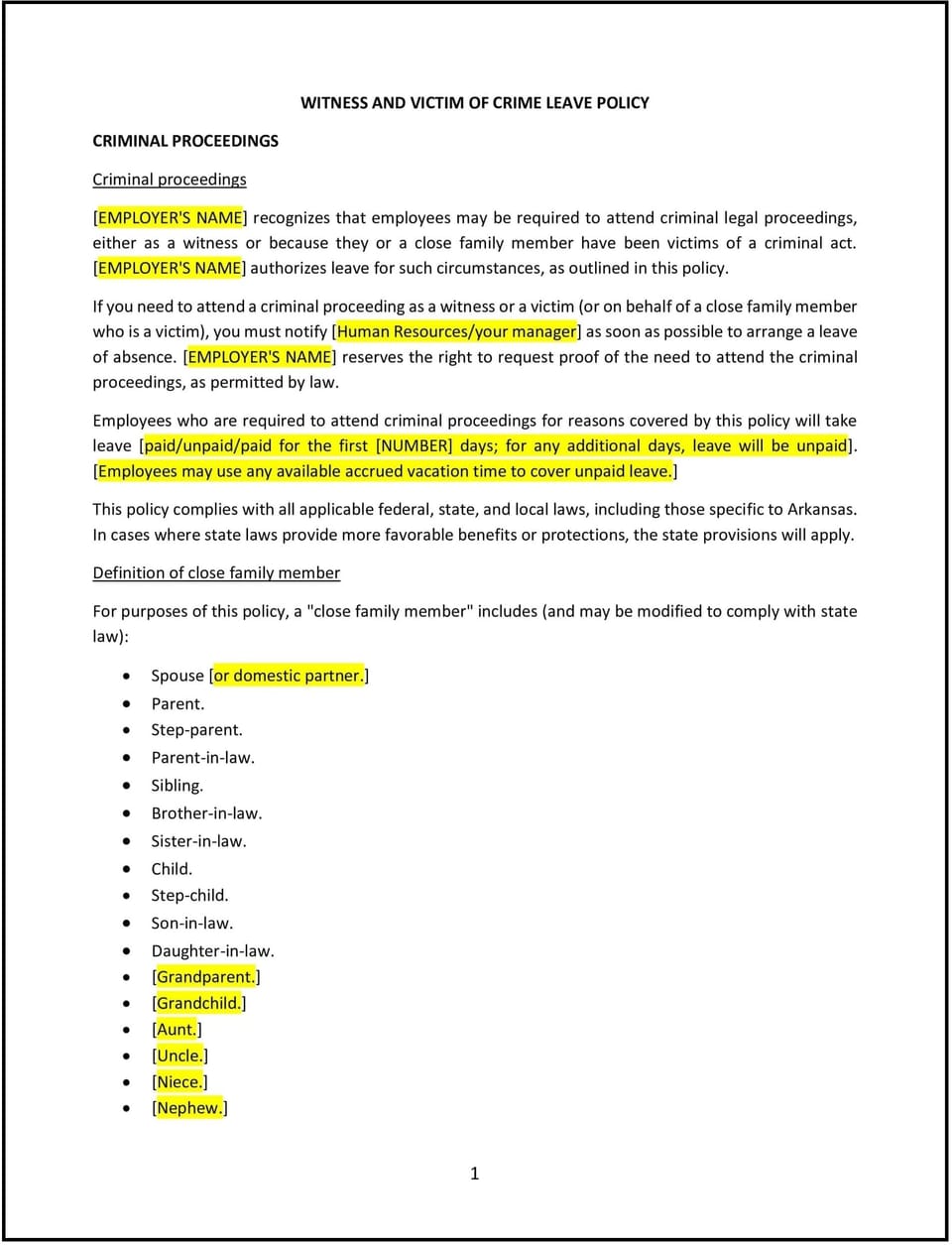Witness and victim of crime leave policy (Arkansas): Free template

Witness and victim of crime leave policy (Arkansas)
In Arkansas, a witness and victim of crime leave policy provides businesses with guidelines for managing employee absences related to fulfilling legal obligations or recovering from criminal incidents. This policy ensures employees can attend court proceedings, cooperate with law enforcement, or address personal needs resulting from a crime while maintaining workplace fairness and compliance.
This policy outlines eligibility, procedures for requesting leave, and the terms under which such leave is granted. By implementing this policy, Arkansas businesses can support employees during challenging times while ensuring operational continuity.
How to use this witness and victim of crime leave policy (Arkansas)
- Define eligibility: Specify which employees qualify for leave, such as those subpoenaed as witnesses, victims of crimes, or immediate family members of crime victims.
- Establish request procedures: Provide clear steps for employees to request leave, including advance notice and required documentation like subpoenas or police reports.
- Clarify leave terms: Outline whether the leave is paid or unpaid and any limits on duration, as allowed by Arkansas laws and business policies.
- Address confidentiality: Ensure employees’ personal information related to their legal or victim status is kept confidential.
- Communicate return-to-work expectations: Provide guidelines for employees returning from leave, including any documentation required.
Benefits of using this witness and victim of crime leave policy (Arkansas)
This policy offers several advantages for Arkansas businesses:
- Supports compliance: Aligns with Arkansas labor laws and federal regulations related to crime victims and witnesses.
- Promotes fairness: Ensures consistent handling of leave requests for all employees.
- Enhances employee trust: Demonstrates the business’s commitment to supporting employees during difficult situations.
- Protects operational continuity: Provides a structured process for managing workloads during employee absences.
- Reduces disputes: Establishes clear expectations for both employees and management regarding leave procedures.
Tips for using this witness and victim of crime leave policy (Arkansas)
- Address Arkansas-specific considerations: Reflect state laws governing leave for witnesses and victims of crimes.
- Communicate clearly: Ensure employees understand their rights and the process for requesting leave under this policy.
- Train managers: Provide guidance on handling leave requests with sensitivity and in compliance with legal requirements.
- Document thoroughly: Maintain records of leave requests, approvals, and related documentation to ensure transparency and accountability.
- Review regularly: Update the policy to reflect changes in laws, workplace practices, or employee needs.
Q: How does this policy benefit the business?
A: This policy supports compliance with Arkansas laws, fosters employee trust, and provides a structured process for managing leave related to legal obligations or crime recovery.
Q: What situations qualify for leave under this policy?
A: Eligible situations include serving as a witness in court, cooperating with law enforcement, or addressing personal needs as a victim of a crime.
Q: How does this policy support compliance with Arkansas laws?
A: The policy aligns with state requirements for granting leave to witnesses and crime victims, ensuring lawful and fair treatment of employees.
Q: What documentation should employees provide when requesting leave?
A: Employees should submit documentation such as subpoenas, police reports, or court notices to verify their eligibility for leave.
Q: How can the business manage workloads during an employee’s leave?
A: The business can redistribute tasks, cross-train team members, or hire temporary support to maintain productivity during absences.
This article contains general legal information and does not contain legal advice. Cobrief is not a law firm or a substitute for an attorney or law firm. The law is complex and changes often. For legal advice, please ask a lawyer.


